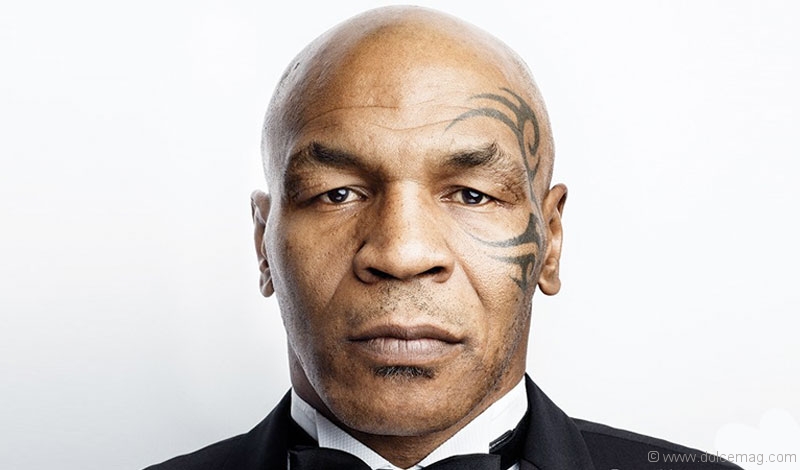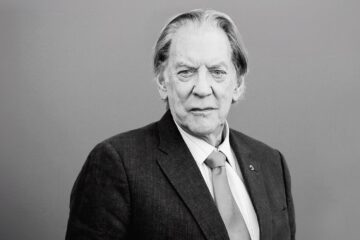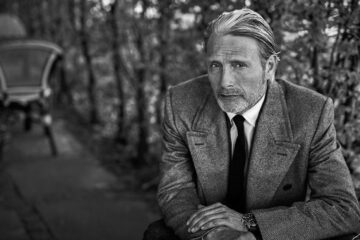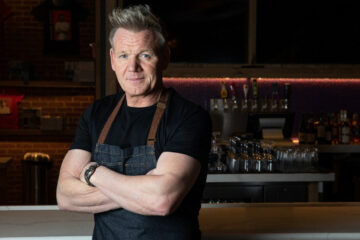Mike Tyson – Iron Mike
The world gave him a second chance. Now, Dolce sits down with the boxing icon to see what he’s doing with it .
Tyson in Vegas. The city of sin had been the stage for so many of his iconic fights, so it wasn’t surprising that Mike Tyson asked to do this cover story here, where he lives with his wife and kids. It made sense: Iron Mike in his city of show business, gambling and fights. A match made in heaven. Or it used to be.
Tyson’s life has been a well-documented roller-coaster ride. A difficult childhood, then his meeting with trainer Cus D’Amato that changed everything. He was a world boxing champion by age 20. After three years in prison for rape allegations that he has always contested, he still had about $400 million in the bank. Within a few years, he’d spent it all and declared bankruptcy, mainly due to his addictions. He had hit rock bottom. But seemingly out of nowhere, he started an acting career, and over time, the “baddest man on the planet” stopped fighting his good side. The reinvention of Mike Tyson had begun.
Everyone deserves a second chance, but perhaps that’s never been more true than in the case of this icon, who stepped out of the ring and into a new version of himself: Mike Tyson, actor, stand-up comic, cartoon character and, most importantly, caring father. In fact, he has branched out to doing so many different projects that fans are asking, “who is Mike Tyson in 2016?”
Upon arriving at Tyson’s home, which is perched on the hills that overlook Las Vegas, I’m greeted by his friendly wife Kiki. After waiting a few hours for Tyson to join us, when he finally did, he was as focused and professional as the moment he’d step inside the ring, matching the intensity of his boxing days with the charisma of his present-day movie career. With his youngest daughter sitting on his lap, we settle in on his living room couch to get to know the new Mike Tyson.
BOXING
Q: Looking back, is there any part of your career as a professional fighter that you would change?
A: No. Everything happened for a reason. You and me probably wouldn’t be here if I had gone a different direction.
Q: You have said before that you were not comfortable with people’s image of you. Which part would you want to change? What did people not understand about you?
A: That I’m a human being. In my profession, I became the best. Some people even think the best ever. I don’t really think I’m “the best ever,” but the reason why people think I’m the best ever is that I was willing to go places that no one else was willing to go, physically, emotionally, professionally. I just wanted to be the best that I possibly could be in my particular time. Not necessarily at that moment, but for posterity, for my great-great-grandkids. That’s what people have been saying — probably for my own self-preservation, my self-aggrandizement, my ego as well. In the end, it’s all about energy.
Q: Were you already thinking about history at that time?
A: I don’t know. I guess, as a young kid, with low self-esteem and insecurities, I didn’t want my pre-eminence to
be ignored.
Q: What do you think is missing from the world of boxing today? Do you think MMA/UFC is the new “exciting thing” like boxing was when you started?
A: Boxing is such an enigma, as a sport. This is what it really is: two hundred years from now, there will probably only be five fighters that people will remember. That’s what it’s all about. It’s not about having money, about becoming rich. They won’t stop mentioning your name until the planet’s disintegrated: that’s what this is really about. People are stating their names in the art of pugilist, fisticuff, combat, fighting. I like the word “fighting.” That’s not a politically correct word in this field anymore. Fighting is not cool now. It can conjure up negative stuff, but not if you use it in a spiritual perspective. Fighting is spiritual, but you just can’t see the spiritual in it because it’s mostly dominated by the physical aspect. We want to be Achilles in our own mind. The king of all the fighters.
Q: But he had one weakness that did him in …
A: We all have weaknesses. He probably had other weaknesses but we were only told of one. That’s on my bucket list: before I die I want to go to Achilles’ grave in Greece.
Q: If you were a kid today, do you think you would still do boxing, or would you be attracted to Mixed Martial Arts?
A: I don’t know. The only reason I became a boxer is because I met somebody when I was pretty young, pretty raw, who was an ex-boxer and knew about training. If he had been a wrestling coach, I would’ve been a wrestler. I just think at that particular time of my life, I was ordained to be a fighter champion. The sport was boxing, but I look at it as fighting. I always wanted to be the best fighter in the world. I know it sounds crazy!
Q: Do you have a favourite boxing movie?
A: Rocky III: Eye of the Tiger, the one with Mr. T.
ACTING
Q: How did you decide to become an actor?
A: One of my friends was doing a movie and said, “Mike, come see us do the movie.” I was on set and my friend, who is the director, asked me to hit another friend who is one of the actors, for real. He said, “Mike, you gotta hit Bob.” I said, “are you crazy?” I looked at these guys and said, “I ain’t doing it.” The actors said, “Come on, Mike, you gotta do this for the movie!” I said OK, and I hit him! I thought, “these guys are crazy!” That’s how it all started. Then I was in another movie. It started to feel natural to me. So my manager said, “Mike, we’re gonna do this for real now. We’re gonna take it seriously. We’re gonna make some money. But first, you gotta make sure people pay you for this!” Because I was just doing it for my friends, I never got paid at the beginning. I used to go out with them, hang out all night. Just like what you do with friends.
Q: Most people became aware of you as an actor with the movie The Hangover.
A: That was pretty good for my career and me. Everything took off after that, I did other things, I did my one-man show. It opened up the door and let me branch out to do other things — things I never dreamed of doing before.
Q: How do you look at the movie, a few years later?
A: With gratitude, a lot of gratitude. That’s what I hear all the time, “where’s your tiger?” People want to pay me to sing the song [“In the Air Tonight”] and do crazy things.
Q: Since seeing The Hangover, I was wondering if you were a fan of the Phil Collins song “In the Air Tonight” in real life?
A: Oh yes, absolutely. In the eighties, when I was a young kid, I was singing “I can feel it coming in the air tonight” when I wanted to become champion of the world.
Good times.
Q: I saw your great one-man show Mike Tyson: Undisputed Truth recently. I was wondering how the idea to do such a show came about?
A: I’d seen Chazz Palminteri’s show A Bronx Tale on stage.
Q: Robert De Niro told me he first saw it on stage and then they made the movie version of it.
A: The stage version is better than the movie. I saw the movie once, but I saw the play five or six times! I kept travelling to see the show. This is the real thing that got me to do this show. It’s not ego. The audience was so captivated, and it was like nine hundred people. They didn’t make any noise. There was silence, I was like “wow!” You could’ve heard a mouse piss on the carpet. At that moment, I turned to my wife, who was there with me, and told her, “Baby, I want to make people feel like he’s making me feel right now.” If I could make people have that feeling, I knew I’d have something.
Q: I think that’s what people felt when they saw your show too.
A: That’s why I’m so happy! It meant they felt about me the way I felt about him, Chazz Palminteri. That’s really performing at your best.
Q: It’s not really stand-up comedy, but there are funny moments, it’s like …
A: A roller-coaster of emotions. That’s what somebody told me. I like that.
Q: Did you have favourite stand-up comics growing up that inspired you?
A: So many. Richard Pryor is great. George Carlin is great. Robin Williams. They can cross all boundaries of race. Joan Rivers was great. Eddie Murphy is great. But no one’s like Richard Pryor. Times are different. But I’ll tell you why nobody’s better than Richard Pryor. It’s his humility, his intestinal fortitude. He would sometimes bomb out, but then come back the next day and make people die from laughing! [Laughs] Oohh … I like that! He could get destroyed the day before, but come back for more the next day.
Q: Do you have plans to get back on stage?
A: We’re going to do different shows. Addicted to Chaos, Manic Moments — those are the names of my future stage projects.
Q: Now you even have a new cartoon TV series called Mike Tyson Mysteries. That’s very different from the rest of what you do.
A: I didn’t want to do it at first. Two executives came to my place and presented the project. I said, “I don’t want to do that crap.” They called me again and said, “Try it.” It turned out to be a No. 1 hit! It took me by storm. When I saw the finished product I said, “Wow, this is pretty awesome.”
Q: It almost has a seventies vibe to it, like Scooby-Doo.
A: It’s like The A-Team meets Scooby-Doo. But we got pigeons instead of a dog.
Q: And now you’re doing martial arts movies. Can you tell us about your new movie Ip Man 3?
A: It’s really awesome. And I’ve got another one, a fight movie coming up called Chinese Salesman. And the one with Donnie Yen … I’m just very grateful to be part of that. I’ve become a fan of gratitude. I’d never really understood gratitude before; I didn’t think that word sounded well. But now I understand it, I’m committed to it. It can help you with your mistakes too. No need to beat yourself up over your mistakes. Be gentle with yourself.
Q: Compassion starts with yourself, that’s part of Tibetan Buddhism.
A: It took me almost fifty years to understand the meaning of the word “gratitude.” Fifty years to find out to be nice to yourself. I tried to kill myself for fifty years! Then I finally found out about gratitude.
Q: Then it’s great because it means the future is looking so bright.
A: Yes. But that’s why I’m mad. Because I could’ve had this bright future so much earlier. It’s just one word that you have to understand. You have to be in touch with that word. I think the experiences you go through allow you to be in touch with that word. But I could’ve avoided a lot of stuff just with that word, with “being nice to yourself.” Argh! I thought “being nice to yourself” was [having sex with] a beautiful woman, buying a great suit, buying a house, having a nice car, eating great food. But now, to me being nice to yourself is just staying in the house with my kids, being in the pool, or just having some private time with myself in the guest room and smoking a cigarette, eating some blueberries! [Laughs] Doing some karaoke with the kids. That’s being kind to yourself.
Q: But sometimes in life there’s also luck involved. You’re five minutes late and wouldn’t meet the person that would change your life.
A: It’s not called luck; it’s timing. Luck comes when you’re working so hard, so hard and you’re not getting anywhere. You’re almost planning to give up. But, boom! It happens and you’re good to go.
Q: How was the shooting of Ip Man 3?
A: It was so smooth. Besides breaking my finger, it was very smooth. Three weeks of fighting. Half a per cent of drama, but other than that, it was just smooth. We shot in Shanghai.
Q: Was it your first time in China?
A: It was my sixth time in China. There’s too many people there to be a democratic country. But with the right strategic plan, they could be like a platinum mine.
There’s so much good that comes from there. They have some amazing antiquities that they’re still doing research on. There’s so many secrets there. There’s a province, in the desert part, very dry, with Caucasian giants [Tarim mummies]. Like eleven or twelve feet, I think. Blond hair, blue eyes. They probably married some Asian or Chinese people, three thousand years ago. When I saw them, my friend said, “They look like Chuck Norris!” They said they might have come from when the Greeks were fighting in India.
Q: Ah, from Alexander the Great’s army?
A: Yes. The women were like eight feet tall. You can still see the faces and the hair of the mummies really well, they don’t even look old — but they’re three thousand years old! The masses of people in China don’t know about it. The basic focus of most people is on everyday life, on food. Or focusing
on what’s going on with the government. They have about nine thousand African refugees there, many of them undocumented. I’ve seen some Russians there. All types of great, beautiful people there. It’s a good place. The new movie I did there is with Africans and Russians.
Q: I saw some news about it; it’s called The Chinese Salesman, right?
A: Yes.
Q: What is the story of this movie?
[Silence]
A: I’m not really allowed to talk about it yet. I’m a bad guy … [he laughs] I’m a real bad guy!
Q: Were you familiar with Donnie Yen [甄子丹] before filming Ip Man 3?
A: Absolutely. I’m a martial arts fanatic! The Shaw Brothers [邵氏兄弟], and all the other movies of that time, I’ve seen them all!
Q: What’s your favourite?
A: Oh … let me see. I think Gordon Liu’s Heroes of the East [邵氏兄弟]. In that movie, Shaolin faces ninjas. Gordon Liu was also in The 36th Chamber of Shaolin, The Monk. He has health problems now. He was in Kill Bill too. Five Deadly Venoms [五毒] — that was pretty awesome too. There’s just so many awesome movies. And not only the movie. What makes some movies is not just the movie, but certain scenes. And once you’ve seen the whole movie, you forget about it and still think only about that one scene! So you have to see the movie again and again to get it. Do you kind of understand?
Q: Yes. Like when you saw Bruce Lee facing Kareem Abdul-Jabbar in Game of Death.
A: Ah, Bruce Lee. Let me explain what he means to the black community: the three scratches, wooooo! He’s just super bad! Smooth and bad! It was a different time.
Q: He was born here but went back to Asia, he was the first one to make East and West meet.
A: Listen. Now we have computers and everything. But back then, we didn’t know any other Chinese [people]! We only knew Bruce Lee. Before Bruce Lee, there was only that detective guy, Charlie Chan — and he wasn’t even played by a Chinese actor. Before Bruce Lee, there was no politician, no Asian entertainer in America, there was nothing. Bruce Lee was the guy that made us go out in the street, start fights, kick people in the head, sometimes for no reason! Bruce Lee made us do that. After watching his movie, we thought, “I gotta do this stuff to somebody!”
Q: He even invented a new martial art.
A: He was a different kind of fighter. He didn’t believe in fighting in any tournaments. I remember a Bruce Lee conversation, he was talking with somebody and they were talking about grappling. Bruce Lee was saying, “When I think of grappling, I think of being on the ground. When I think of being on the ground, I think of being stomped! When I’m fighting four or five guys, I can’t afford to be on the ground!” Bruce Lee took it to another level. He wasn’t thinking about one guy, he was thinking about taking on five guys! This guy’s hard core!
LIVING
Q: I remember reading that you grew up in a poor neighbourhood and then tried to fit in the “white world.” Can you explain the contrast between the two?
A: What surprised me the most is what was going on in my head. My head made it bigger and worse than what it really was. People being good people. Once I knew Cus [his white trainer and mentor] had my total back, one hundred per cent … for instance, this one time, there were some professional South African fighters coming from abroad living in the house with Cus and me. They came to train because of the gym. It was during the time of Apartheid. And I remember Cus talking to them and saying, “Listen, let me explain something. There’s a young black boy in the house, he’s our family. I expect you to respect him as you respect us.” When he said that, boom! That just knocked me away. I knew this was my house then. I have to conduct myself like it’s my family. I have to respect this house, I have to protect this house, make sure nothing happens to this family.
Q: You’ve had a reality show on Animal Planet called Taking on Tyson. Could you talk a little bit about this?
A: That was a few years ago and that was like the biggest show in Europe.
Q: Can you tell us a little bit about your love for birds?
A: It’s just what I do. I can’t even explain it. It’s just the first thing I ever did — raise pigeons. The first time I got into a fight, it’s because someone killed one of my pigeons.
Q: You still have pigeons?
A: Oh yes. I just moved into my new house, but as soon as I build a coop for them, I’m moving them here with me. When I die, I have to will them to somebody, somebody needs to come and get them.
Q: Why did you decide to live in Las Vegas?
A: When I first came here, it was for the Olympic trials and I lost. But I thought, “This is the greatest place!” Great hotels, free food, awesome-looking chicks, bunny girls — I was just having fun. It was like, 1983, 1984. This is just who I am now, living in Las Vegas.
Q: Las Vegas is now much bigger than it was in 1983.
A: Listen. In 1983, Cus, my coach, thought Las Vegas was an oasis. He’d seen it in the sixties, and was saying, “Look at how big this place is!” Now that I think about it, back then in 1983, Vegas was nothing! There were only maybe three or four hotels. It was nothing! It was low-class — you could take a girl and do her in the stairwell! Now it’s high-tech lifestyle. In 1984, it was still like a horse town. They had big-time fights, but it was still a horse town.
Q: You’ll never leave Vegas, then …
A: I don’t think so, God willing. But my kids, they’re their own people. For me, this is where I will stay.
Q: I heard you like Donald Trump.
A: Donald Trump is a very interesting and engaging guy when you meet him. You look at his turnout [at his meetings] and at his polls, you can see why. You can learn a lot from him. I think in China, they know him better than I do, they did deals with him. The Chinese government knows him. He’s the best at what he’s doing right now. Today is his moment. They can’t take it from him right now. It doesn’t mean he’ll be president, but I hope he wins the nomination. The people want him. The country is for the people. He’s getting close to catching up with Obama as far as slack, as far as how much hate he’s getting.
Q: It’s sad that some people never gave Barack Obama a fair chance …
A: What Obama accomplished is incredible. It’s a milestone. My mother could never dream of seeing that. Regardless of what he does. The image of who he is, my mother couldn’t dream that. Her mother and father could’ve never dreamed that. My children, their dream capacity, their intestinal fortitude, can go places I can never go just by watching him becoming president. Even if I don’t agree with him, what he can do for my kids, I cannot do. It’s amazing what he has done for blacks, for Latinos, just by being there. He can take them to somewhere we could never go, that’s the future. He’s the catalyst for many other successful black pioneers — just because of him. My son is better because of him! My grandson will be better because of him! That’s one thing we never thought would be possible. It’s just so awesome.
Q: Your past troubles have been well documented, but you’ve been able to turn your life around and have a second chance and renewed success as an actor. What advice would you give to people who have been down on how to get back up?
A: You can change your mind anytime you want. You could be who you want anytime you want. You could say, “right now, I want to be in entertainment” — become that person! Work with that. Get the lifestyle. I used to have the lifestyle of a hustler, a player, a cool guy. Now I have the lifestyle of a working man. I go to work, I come back home grateful to have children. I’m not even supposed to live in a house like this. I’m very grateful to be living in this house. I’m so grateful.
Q: Thank you, Mike.
A: Thank you, brother. I need to go do some cartoons now … Mike Tyson Mysteries!
Photos By Marco Grob / Styling By Ise White / Grooming By Natasha Chamberlin
























































































No Comment